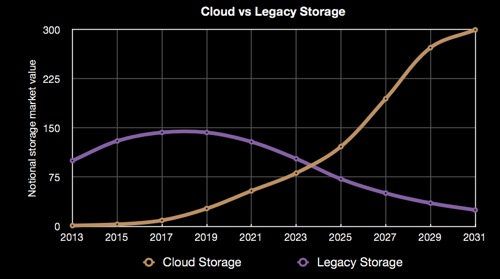Original URL: https://www.theregister.com/2013/04/23/cloud_vs_legacy_storage/
Array makers, what's that noise? It's the hungry Amazonian horde
...And they're here to swipe you and your lunch
Posted in SaaS, 23rd April 2013 06:04 GMT
Blocks and Files Storage in the cloud is going to start stripping legacy storage suppliers of their value and prompt an era of vertical disintegration in the storage business.
This is assuming storage in the cloud starts savaging storage supplier revenues. Assume away, on the basis that Amazon, Google and Microsoft's storage-in-the-cloud systems are growing - as are file sync 'n share businesses involving cloud storage. Storage workloads are moving to the cloud but the storage market is expanding and this masks the erosion of market share by cloud storage.
Every byte stored in Amazon's cloud, or Azure, or the Googleplex, or Rackspace, is a byte not stored in a private VMAX, VNX, Isilon, FAS-whatever, VSP or HUS, StoreServ, StoreVirtual, StoreWhatever, V7000, XIV, or DS-whatever.
El Reg storage desk estimates that by 2017 the number of bytes stored in cloud vaults will be rising faster than the number stored in legacy arrays. This is based on various feelers out in the industry plus the fact that Amazon's S3 cloud now has at least two-trillion objects just year after passing the 1tr mark, and it previously took eight years to reach that point.
And cloud storage suppliers will not buy legacy arrays, not once they start storing tens of petabytes and more. They'll find - like Amazon, Facebook, Google and others - that building the storage they need out of basic commodity components will cost many times less to buy and operate. The economies of scale will operate with a vengeance here.
So, as cloud storage rises and rises, sales of legacy arrays will stop growing, flatten out and then fall, we reckon.
Suppose we try to visually show the rise of cloud storage and the effect of this on legacy storage sales, what sort of graph might result? Your humble hack has produced an arbitrary graph looking ahead in two-year units and with a vertical scale of arbitrary storage value, starting at 1 for cloud storage and 100 for legacy storage to represent the head start by traditional arrays, and applying growth and shrinkage factors to these numbers.

Our crystal-ball prediction of cloud versus traditional storage
Three questions. First, will cloud storage replace on-the-premises storage? Second, if it is, what happens to legacy storage vendors? Third, how fast will things change?
The answer to the first question depends upon your trust in cloud computing and on-the-premises storage. Vulture Central thinks cloud storage may well increasingly replace in-house arrays. On that basis the existing legacy storage vendors will see their storage array business flattened.
So, you're a disk array biz's CEO. What should you do?
Work out how much time you have, and within that concentrate resources on the growth parts of your business where cloud can't compete - such as offering a very fast data request response compared to what a cloud provider can manage. That scene, by the way, is already starting to go to the flash vendors: they're touting PCIe cards with wads of non-volatile memory that are tightly coupled to the processor bus, thus keeping large amounts of data close at hand. So you better start buying up those chips.
Then you must decide whether to supply hardware to the cloud service providers or not. If you do so, you must avoid half measures; you have got to get your prices down to Taiwanese factory levels or less in order to compete against the aforementioned cheapo commodity gear. Also, you are not going to sell your on-premises data management software to the likes of Amazon, Azure and Google. That stuff is destined for the scrap heap.
Forget about incremental improvements to your existing products. As a long-term strategy, that idea sucks. It's time to think outside of your comfort zone.
Alternatively, become a public cloud service provider yourself. Buy Amazon, if you can find $150 billion or more. Buy Rackspace. Buy the biggest server hoster and co-location operator you can find. Buy Seagate or Western Digital; the cloud storage guys will need disk drives for a while yet. Buy a flash fab operator. They'll need flash too. You have, we think, to vertically disintegrate downwards, to the component suppliers, or upwards to the cloud service providers.
Cloud storage will, we suggest, cause vertical disintegration in the storage business. Suppliers can either choose to do some vertical disintegrating or get disintegrated. Stark choices. But the cloud storage barbarians, led by Jeffrey Preston Bezos and his Amazonian hordes and imitators, are at the gate. What you gonna do? ®
Comments to this forum topic, please.